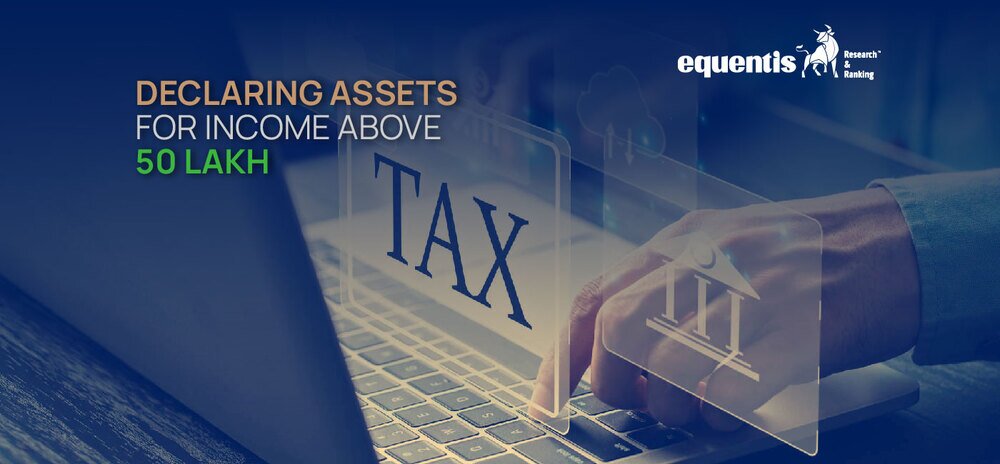Tax season is upon us again! While many of us struggle with deductions and calculations, there’s a specific form that we need to pay extra attention to: Schedule AL (Asset and Liability). This schedule is like a financial snapshot, but only for those with a total income exceeding ₹50 lakh.
As per the income tax (IT) regulations, individual and Hindu Undivided Family (HUF) taxpayers with a net income exceeding ₹50 lakh are required to provide details of their assets in Schedule AL (Asset and Liability) of ITR forms 2 or 3. This includes immovable property, financial assets, vehicles, artwork, sculptures, and associated liabilities.
If you fall into this category, let’s explain what Schedule AL is all about in a clear and concise way.
What is Schedule AL?
Consider it as a separate compartment in your Income Tax Return (ITR) form. This compartment is specifically designed for you to disclose details of your assets and liabilities as of the end of the financial year. Assets are things you own, like your house, car, or investments. On the other hand, liabilities are your debts, such as a home loan or car loan.
What Needs to be Disclosed in Schedule AL?
When filling out Schedule AL, think of it as categorizing your assets and liabilities. Here’s a breakdown of what you typically need to include:
- Immovable Property: This includes your land, house, or any other real estate you own. Details like location, size, and year of acquisition are usually required.
- Movable Property: This could be your car, jewelry, artwork, or any other valuable possession. You might need to specify the type and approximate value of the asset here.
- Financial Assets: This is a broad category encompassing things like bank deposits, shares, bonds, mutual funds, and even cryptocurrency holdings. You’ll likely need to mention the type and value of each financial asset.
- Liabilities: This is where you list your debts, such as outstanding home loans, car loans, or any other borrowings. Details like the outstanding amount and the creditor’s name are generally required.
Why is Schedule AL Important?
Understanding your financial picture is crucial for the income tax department. Schedule AL was introduced in 2016 following the discontinuation of the wealth tax. It helps them assess your overall wealth position and track significant asset and liability changes. This transparency helps ensure a fair and balanced tax system.
Tips for Filling Out Schedule AL
- Accuracy is Key: Since the purpose of Schedule AL is transparency, ensure all the information you provide is accurate and up-to-date. Double-check your numbers and details to avoid any discrepancies.
- Gather Documentation: Having documents like property papers, loan statements, and investment summaries handy can make filling out the assets and liabilities form much smoother.
- Seek Professional Help: If navigating the complexities of Schedule AL seems difficult, consider consulting a tax advisor or chartered accountant. They can guide you through the process and ensure everything is completed correctly.
Schedule AL might seem like an extra hurdle, but it’s simply a way for the government to maintain a fair tax system. By accurately disclosing your assets and liabilities, you’re ensuring a smooth and hassle-free tax filing experience.
With the advent of online ITR filing, many platforms offer user-friendly interfaces to guide you through Schedule AL. Don’t hesitate to explore these resources for a more intuitive filing experience.
FAQs
What assets do I need to declare in Schedule AL?
You need to list all your financial and non-financial assets as of the end of the financial year. This includes cash, jewelry, vehicles, real estate, stocks, mutual funds, archaeological collections, drawings, paintings, sculptures, etc.
How do I declare assets like provident funds, NPS, cryptocurrencies, REITs, and P2P loans?
Experts recommend including these under the “shares and securities” column. This category also covers stocks, mutual funds, and government securities investments. Remember to declare only derivatives held on March 31st, not the entire year.
Should I use the current market value or purchase cost for my assets?
Always use the purchase cost for houses, cars, or jewelry. Don’t worry about current market fluctuations – just focus on what you originally paid.
How do I declare mutual funds, stocks, fixed deposits, and other investments?
Declare the total amount you invested during the year, not the year-end value. If you bought and sold an investment within the same year, don’t include it. For bank accounts and cash, use the balance on March 31st.
Do I need to declare the original or outstanding loan amount for liabilities?
Focus on the outstanding loan amount as of March 31st, as this reduces over time. Past declarations can justify any discrepancies with your income.
Should I declare all loans or just those used to buy assets?
Only declare loans used to purchase assets, like a home loan for your house. Personal loans or credit card balances are not required unless used for asset acquisition.
How do I declare inherited property?
Declare inherited property at the original purchase cost paid by the previous owner. If you can’t find this information, use the circle rate (government-determined land value) on the acquisition date.
Will there be a mismatch if my inherited property exceeds my income?
No. The tax authorities might ask for clarification, but you can easily justify it with documents proving inheritance.
Do I need to declare foreign assets in Schedule AL?
Yes, but you also need to declare them in Schedule FA. The declaration period and value requirements differ between the two schedules.
What if I invest in my spouse’s name (below ₹50 lakh income)?
Even if your spouse doesn’t need to file Schedule AL, you still need to declare any investments made in their name but funded by you. This is due to the “clubbing provision” for income tax.
Do I need to declare business assets already listed on my balance sheet?
No, assets declared in your business balance sheet don’t need to be repeated in Schedule AL. However, personal assets like your house still need to be listed.
Is there a penalty for not declaring assets in Schedule AL?
Currently, there’s no specific penalty. However, it’s highly advisable to declare everything accurately to avoid potential future issues and penalties for inaccurate or omitted information.
What happens if I don’t file Schedule AL?
Not filing Schedule AL when mandatory can attract penalties and even scrutiny from the tax department. Complying with the requirement is the best way to avoid any potential issues.
How do I report insurance policies?
Pure-term insurance policies, which don’t have any surrender value, typically don’t need to be reported in Schedule AL. However, you might need to disclose other types of insurance policies with a surrender value.
How useful was this post?
Click on a star to rate it!
Average rating 4.7 / 5. Vote count: 3
No votes so far! Be the first to rate this post.
I’m Archana R. Chettiar, an experienced content creator with
an affinity for writing on personal finance and other financial content. I
love to write on equity investing, retirement, managing money, and more.
























